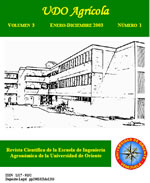
|
Revista Científica UDO Agrícola
Universidad de Oriente Press
ISSN: 1317-9152
Vol. 13, No. 1, 2013, pp. 128-134
|
 Bioline Code: cg13015
Bioline Code: cg13015
Full paper language: English
Document type: Note
Document available free of charge
|
|
|
Revista Científica UDO Agrícola, Vol. 13, No. 1, 2013, pp. 128-134
| es |
Efecto de la densidad de siembra, fertilización potásica y almacenamiento de los bulbos sobre la concentración de alicina en ajo criollo morado ( Allium sativum  L.) determinada mediante HPLC L.) determinada mediante HPLC
MUJICA, Henry; PÉREZ DE CAMACARO, María; SANABRIA CHOPITE, María Elena & GIMÉNEZ, Aracelis
Resumen
El propósito del trabajo fue determinar las concentraciones de alicina en bulbos de ajo morado y su relación con la densidad
de siembra, la nutrición con KNO3 y las condiciones de almacenamiento, utilizando la técnica de HPLC. Para la etapa de
campo se empleó un diseño en bloques al azar con arreglo de tratamientos en parcelas divididas, con tres densidades de
siembra (100. 50 y 33,33 plantas m-2 ) y tres dosis de KNO3 (25. 50 y 100 kg ha-1). Para la etapa de almacenamiento el
diseño fue completamente al azar, con arreglo de tratamientos en factorial 32x2, distribuidos en dos lotes de 180 bulbos, uno
almacenado a temperatura ambiente (25 ± 2 °C y 70% HR) y el otro refrigerado a 10 ± 2°C con 85% HR, durante 90 días.
Las evaluaciones se realizaron al momento de la cosecha para todos los tratamientos aplicados en campo, y de allí se
seleccionó el tratamiento con mayor concentración de alicina para evaluar su comportamiento a los 30, 60 y 90 dda. Como
resultado, el tratamiento de 50 plantas m-2 y 100 kg ha-1 presentó el mayor nivel de alicina (12,3 mg g). Se registró una
mayor concentración de alicina en los bulbos colocados a 10 ºC, 85% HR. Además, se observó una reducción significativa
del contenido de este compuesto en las dos condiciones estudiadas a medida que transcurrió el tiempo de almacenamiento,
aunque la pérdida fue mayor en los bulbos almacenados a mayor temperatura y menor HR.
Palabras-clave
Allium sativum; tiosulfinatos; nutrición; almacenamiento
|
| |
| en |
Effect of planting density, potassium fertilization and bulb storage condition on allicin concentration of purple creole garlic ( Allium sativum  L.) by HPLC method L.) by HPLC method
MUJICA, Henry; PÉREZ DE CAMACARO, María; SANABRIA CHOPITE, María Elena & GIMÉNEZ, Aracelis
Abstract
The purpose of this research was to determine the levels of purple garlic allicin and its relation to planting density, nutrition
with KNO3 and storage conditions using the technique of HPLC. For stage field design was used with random block
arrangement of treatments in a split plot, with three planting densities (100. 50 and 33.33 plants m-2 ) and three doses of
KNO3 (25. 50 and 100 kg ha-1), For the storage stage used a completely randomized design with factorial arrangement of
treatments in 32 x 2, divided into two lots of 180 bulbs, one stored at room temperature (25 ± 2 °C and 70% RH) and the
other cooled to 10 ± 2 °C with 85% RH for 90 days. Evaluations were performed at harvest time for all treatments applied
field and hence the treatment was selected with the highest concentration of allicin to evaluate their behavior at 30, 60 and
90 das. As a result, treatment of 50 plants m-2 and 100 kg ha-1 had the highest content of allicin (12.3 mg g). A higher
concentration of allicin was recorded in the bulbs placed at 10 ° C, 85% RH. Furthermore, a significant reduction of the
content of this compound in the two conditions studied as storage time is observed, the reduction was greater in the bulbs
stored at higher temperatures and lower RH.
Keywords
Allium sativum; thiosulfinates; nutrition; storage
|
| |
© Copyright 2013 - Revista Científica UDO Agrícola
Alternative site location: http://www.udoagricola.orgfree.com
|
|
